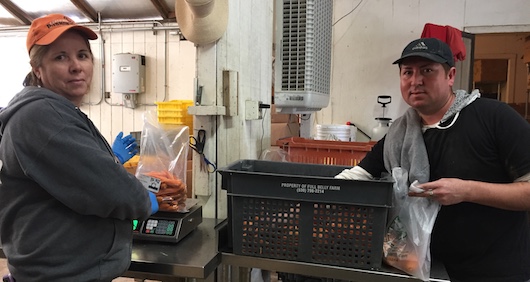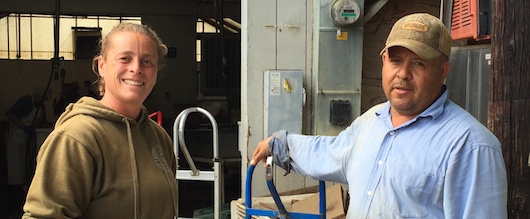Full Belly Farm employs a year-round, stable crew of around 60 people. They work in the field, in the packing shed, in the office and some people work a little bit of everywhere. It has long been our goal to keep as many of our crew members as possible working all year round, even though the amount of work required to keep the farm ship-shape varies tremendously from season to season.
In order to keep people employed year round, we dry flowers in the spring and summer, and the flower crew makes wreaths in the winter. We grow crops year-round and our CSA members sign up for veggie boxes, helping us to keep our harvest crews working in the winter. We work on all kinds of construction and clean-up projects during the winter and even shorten the work-days and the work week, which makes it lean but workable for our core crew members. But this core crew that works year round is never able to keep up with all of the work it takes during the busy summer and fall.
The seasonality of agriculture has always created this kind of situation in which many farm workers find themselves underemployed during the cold part of the year and over-employed the other half. With the generally low wages that farming provides, being unemployed part of the year can lead to unsustainable annual incomes and uncertainties that are pretty daunting for any sort of family life. Agriculture in many states has filled seasonal labor needs with visitors from other lands, and that’s what built California agriculture as well — waves of Chinese, Japanese, Filipino and Mexican immigrants, coming here to work in the fields, often not under the best of conditions.
Francisca Jacobo and Fredy Blanco (right) are shown here in our packing shed.
The vast majority of agricultural labor in California is still foreign born and many of the core year-round employees at Full Belly are part of family groups that moved here from Mexico decades ago and are now filling the local schools with bilingual kids that were born in the U.S.
Since mid-April this year, as usual, Full Belly started hiring, and our crew has swelled to over 80 people, and will probably grow even more. With all of that help, we have been keeping up with most of our projects, and we are looking forward optimistically to our summer season.
Janvier (left) started at Full Belly as an intern and now is our Harvest Manager. Bonifacio has worked here since he was 20 years old, at least 30 years ago.
Despite our optimistic outlook at Full Belly, agricultural labor in the U.S. overall faces many problems. The failure of Congress to recognize the importance of immigrants to our economy means that many agricultural workers are living in the shadows, in constant fear of deportation and harassment. At Full Belly, we believe that the undocumented immigrants living and working in the country should be legalized by giving them work visas. All workers should have full labor rights, including the right to change jobs and work for any employer. The government should move rapidly to provide provisional work visas for new immigrants who come to the U.S. to work.
As many as four bills related to immigration may be voted on in the House of Representatives in mid-June. Unfortunately, the legislation, if passed, might turn out to be unworkable. Many farm workers have been in the U.S. for years, decades in some cases. Forcing these workers to leave the country in order to gain legal status, as is required by the legislation, does not recognize the reality of their lives. Any solution for existing workers should allow them a reasonable period for an adjustment of status within the U.S.
Another reality that needs to be recognized by our legislators, is that it is not likely that undocumented workers currently in the U.S. will want to identify themselves while potentially exposing their family members to deportation. Any solution for existing workers should allow family members to stay together.
The impasse around immigration could become an existential threat to agriculture in California. Those of you who care about access to local food may want to contact your U.S. representatives and suggest that they speak up for workable solutions.
—Judith Redmond



